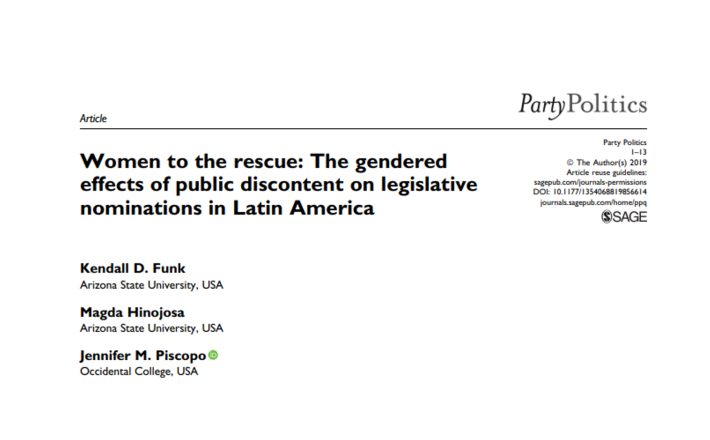Women to the rescue: The gendered effects of public discontent on legislative nominations in Latin America
Source: Sage Journals
Political parties act as gatekeepers, meaning that improvements in the representation of women depend on parties’ willingness to nominate women candidates. Previous research suggests that party characteristics and gender quotas largely explain women’s nominations, but overlooks the political context in which parties operate. This study highlights the gendered outcomes that occur when parties make nomination decisions in times of public discontent, namely increasing political distrust and increasing perceived corruption. We theorize that parties hold similar biases to voters: gender stereotypes that regard women as more trustworthy and honest should advantage women as political trust falls and perceptions of corruption rise. We hypothesize that parties nominate larger percentages of women in these circumstances. Using two waves of data from over 100 political parties in 18 Latin American countries, we find that parties nominate more women when a large proportion of the public distrusts the national legislature, providing support for the theory.
Click here to see the academic article.

Political parties act as gatekeepers, meaning that improvements in the representation of women depend on parties’ willingness to nominate women candidates. Previous research suggests that party characteristics and gender quotas largely explain women’s nominations, but overlooks the political context in which parties operate. This study highlights the gendered outcomes that occur when parties make nomination decisions in times of public discontent, namely increasing political distrust and increasing perceived corruption. We theorize that parties hold similar biases to voters: gender stereotypes that regard women as more trustworthy and honest should advantage women as political trust falls and perceptions of corruption rise. We hypothesize that parties nominate larger percentages of women in these circumstances. Using two waves of data from over 100 political parties in 18 Latin American countries, we find that parties nominate more women when a large proportion of the public distrusts the national legislature, providing support for the theory.
Click here to see the academic article.